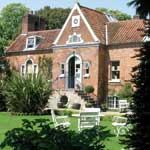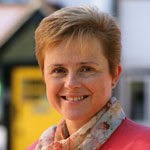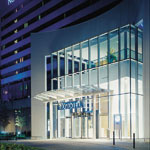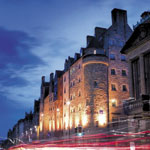The Hotel Cateys: The Green Award shortlist
If you want innovative ideas on how to make your hotel greener, look no further than these four businesses, all of which have been shortlisted for a Green award in our inaugural Hotel Cateys. Emma Allen reports
As our Green Month has shown, environmental issues are increasingly on the agenda for hoteliers. Rising energy prices, eco-savvy customers and mounting regulation means that it's more important than ever for businesses to start being environmentally responsible.
That's where the Green Hotel of the Year award comes in. One of 15 categories in our new Hotel Catey awards, launched earlier this year, the Green Hotel award is designed to celebrate a hotel or hotel group that's leading the way in green business management.
All will be revealed at the awards ceremony on 13 November, but as part of Caterer‘s Green Month, here's a preview of the four hotels shortlisted by our judging panel. The winners of the Hotel Cateys will also be announced in our 15 November issue.
Vanessa and Les Scott, owners of the 10-bedroom Strattons hotel in Swaffham, Norfolk, have always adopted a green approach to running their business - "as it's a small hotel, it made good housekeeping sense to turn lights off and reuse what we could", they say - but the big turning point came in 1997, when they became involved in a pilot green project with Envirowise and the University of Hertfordshire.
Not only did the project highlight some simple wins, including turning off the hotel's espresso machine during the day, which resulted in quarterly savings of £250, it also made them realise how much more they could achieve, by measures such as recycling, motivating staff and sourcing local produce.
Since then, Strattons became the first hotel to win the Department of Trade & Industry's Queen's Award in 2000, which recognises sustainable development, and the couple have introduced some impressive integrated eco measures. All toilets have been fitted with Hippo devices, saving 20% of water each flush, curtains have been fitted with wool linings for extra insulation and meter readings for gas, water and electricity are taken each week to keep track of use. "Monitoring readings also makes our staff more aware of usage and motivates them to turn things off," explains Vanessa.
The couple have also introduced low-energy light bulbs throughout, and thermometers in each of the guest bedrooms so that staff can adjust heating as necessary. One key focus has been waste management. In 20 years, the hotel has never paid for commercial waste collection thanks to a strict recycling policy, regular monitoring and composting and, impressively, landfill waste now accounts for just 2% of the building's refuse.
Despite a rising occupancy rate (currently 92%), their commitment to buying local fresh ingredients and cutting down on packaging means the annual level of total waste has dropped steadily too, from just under 10 tonnes five years ago to less than five tonnes. Elsewhere, annual laundry costs have been cut by more than £600 just by making up bedrooms to specification and reducing towels and pillows for single travellers.
"It's not rocket science," Vanessa says. "And we're only a small hotel. So the environmental and cost savings for a 100-bedroom property, just by doing stuff like this, would be even more significant."
Another success has been the replacement of bathroom miniatures with refillable pump dispensers, which has seen a 97% drop in the number of plastic bottles going to landfill, not to mention a saving of more than £1,000 a year. For the Scotts, being shortlisted for the Green Hotel award is a positive sign that being a green hospitality operator has become mainstream. "It's something we've been talking about for nearly 20 years, so for these issues to be recognised as important is wonderful. It feels as if we've come a long way," they say.
Since buying the 12-bedroom Cottage Lodge B&B in Brockenhurst in the heart of the New Forest, Hampshire, three years ago, owners David and Christina Simons have striven to minimise the impact of their business on the local environment. Being close to the local railway station, they actively encourage guests to arrive by public transport or leave their cars in the car park for the weekend - saying a thank you with free tea and cakes in the afternoon. Other initiatives include harvesting rainwater for the garden, buying as much produce as possible locally and buying furniture from other businesses and repainting it so it all matches.
Determined to make the 300-year-old building more environmentally friendly, the couple have persevered with insulation and draught-proofing throughout, also fitting thick high-quality blinds -"they're better for heat-loss than curtains", Christina (pictured) says - and subsequently have been able to turn the building's heating down from an average of 26°C to 21°C. Not only has this resulted in significant energy-savings, it produced a £3,500 rebate from their energy provider.
Using equipment intelligently has also made a difference. "For example, remembering to turn off the computer when you've finished with it, keeping fridge doors closed or turning off the car park lights during the day. It's simple stuff but it all helps," says Christina.
Last year, wanting to explore further possibilities, they joined forces with other New Forest tourism businesses under the Green Leaf Tourism Scheme, part of a national pilot which promotes sustainability. "It seemed to make sense to see how environmental we could all be," Christina says. "Not only has it enabled us to go up a notch, we've all moved a huge distance in the past 12 months."
That's partly down to the couple's willingness to try out new ideas. As part of the pilot, the Cottage Lodge is trialling chemical-free cleaning - two microfibre recyclable cloths, one for cleaning, one for drying, replace traditional cleaning products - to report back to the group on the results in a few months' time. Another initiative is returning bottles, cartons and jam jars to local producers rather than recycling them.
Seven New Forest hotels, including the Cottage, have signed up and Christina estimates that by next year, 750,000 bottles will have been taken out of the recycling chain. "It's much more sensible to give back bottles and jars to the supplier. Not only does it save us disposal costs, it saves them having to buy new ones if they can simply reuse them," she points out.
This April, the Cottage Lodge won a gold award in the Green Tourism Business Award Scheme, but the couple feel there's still much they can do. They plan to add two environmentally friendly guestrooms, powered by solar panels and harvested rainwater flushing the toilets. "We're still at the very early stages but it will be inspirational stuff," they say.
More and more hotels are now starting to realise the importance of the green issue, but the 630-bedroom Novotel London West in Hammersmith can claim to be a pioneer.
The property has an impressive track record that includes introducing a green policy back in 2004, becoming the first hotel in the UK to win ISO14001 environmental accreditation a year later, and since then it has picked up a string of green awards along the way.
For Tracey Arnold, health, safety and environment manager, the hotel's success has been very much down to the staff. "We couldn't have achieved as much as we have without them," she says. The hotel has 279 employees, 65% of whom have English as a second language, so interactive, fun briefings on different topics were introduced to help cut through any cultural barriers.
On top of that, everyone receives ongoing training, and green issues are on every meeting agenda. Future ideas include getting each department to nominate an energy and recycling champion.
Efficient management of the building is another priority. Water-saving devices such as Hippo bags in toilet cisterns, which reduce flushes to six instead of nine litres, and flow- restrictors on taps and showers, have resulted in some of the biggest savings overall, according to Arnold. The hotel has managed to cut water use by 10% this year alone.
Elsewhere, a computerised BMS (building management system) allows employees to control all major equipment such as boilers or ventilation from a central location. Motion sensors have been installed to control lighting, and air conditioning is automatically shut off in conference areas when rooms are not in use.
The hotel saves more than 100 tonnes of waste from landfill each year via recycling, while hazardous waste such as batteries, light bulbs and electronic equipment are collected for treatment before disposal. Food waste will soon become the next item on the list as the hotel is investigating the possibility of making compost.
Old uniforms are either sent to a charity for reuse or, like all old linen at the hotel, recycled using a specialist textile recycler. The hotel is also planning a scheme for recycling company mobile phones.
Financial savings made from hotel guests not requesting towels or linen to be changed daily are passed on to Plan International, a children's charity. Similarly, savings from the guest carbon offset scheme are invested into sustainable forestry and renewable energy projects.
For Arnold, being shortlisted is an opportunity to motivate staff. "If we were to win this award, it would show the staff that all their efforts have been recognised. That's what sustainability is all about - empowering individuals to help them come together and act as an effective group," she says.
With its sound environmental practices, integrated approach and commitment to staff training in sustainability awareness, it's perhaps not surprising that the Radisson SAS Edinburgh was shortlisted. No newcomer to the green issue, it has run a responsible business programme since 2001 and last year, the 238-bedroom hotel worked with both Envirowise and the Carbon Trust to carry out water and energy audits to pinpoint areas for improvement.
The hotel nailed its eco colours even more firmly to the mast earlier this year by becoming Scotland's first hotel to employ a full-time "green guru", Alexandra Hammond, to promote social and environmental responsibility.
Having set energy targets to cut waste, water and energy consumption, Hammond tackled lighting, replacing as many of the hotel's 3,000 traditional tungsten bulbs as possible with energy-efficient ones. These, she explains, use just one-sixth of the energy and last for seven years. As a result, April saw a 26% drop in energy use compared with the year before, and for an initial investment of just £5,000, Hammond estimates total savings of about £22,000 a year.
Currently being trialled are e-cube devices in each refrigeration unit. Costing about £25 each, and suitable for most fridges, the gadgets check the temperature of food rather than the fridge space, preventing unnecessary cooling and saving up to 30% on energy costs.
Waste targets have also been exceeded in 2007. The hotel invested just over £4,000 in a cardboard compactor and can crusher for recycling, and since then it has doubled its recycling capacity and waste collections have been reduced from twice to just once a week.
Under the hotel's three-step vision of "inform, involve and improve", staff engagement is a priority. All new recruits are given extensive environmental training when they start, as well as monthly departmental sessions on recycling, waste and laundry, at which everyone is encouraged to come up with ideas and give feedback.
A regular newsletter outlines green achievements and the hotel also gives staff information and practical tips on how to be green at home.
The vision extends to suppliers too, with workshops recently introduced to brainstorm green ideas and better practice. "It's also a way to encourage them to look at their own supply chain, to reduce packaging, for example. Our next step is to reuse delivery trays," Hammond explains.
Guests are also invited to get involved, with in-room "tips for a green stay", including a towel agreement, turning off taps and the option to make their stay carbon-neutral through a £1-a-night green levy.
For Hammond, it's about having an integrated set of policies that inform and complement one another.
"Being green doesn't have to mean big or complicated. Almost all hotels can do these things," she says. "Awards like this are so important because they share information and everyone can benefit."
The Hotel Cateys
The Hotel Cateys ceremony takes place on 13 November at the London Hilton on Park Lane. Tickets cost £140 per person or £1,200 for a table of 10. Go to www.hotelcateys.com or e-mail sarah.barnes@rbi.co.uk














